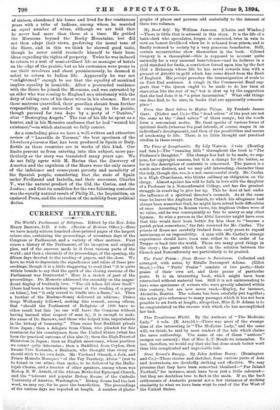My Dead Self. By William Jameson. (Chatto and Windus.) —There
is little that is unusual in this story. It is the life of a bank-clerk who speculates, forges, is convicted, tries in vain to earn an honest livelihood when he is released from prison, and is finally restored to society by a very generous benefactor. Still., certain eccentricities show themselves in the book. Colonel Gregory is a theosophist—this is supposed to account quite naturally for a very unusual benevolence—and he believes in a gold standard for India, a conviction forced upon him by the fact that a Maharaja whose life he has saved rewards him with a present of £40,000 in gold which has come direct from the Bank of England. His protégé preaches the transmigration of souls to an East-End audience. A rough in the Commercial Road sug- gests that "the Queen ought to be made to do her turn at starvation like the rest of us," but is shut up by the suggestion that she had done it in "a prior incarnation." What odd things one does find, to be sure, in books that are apparently common- place






































 Previous page
Previous page